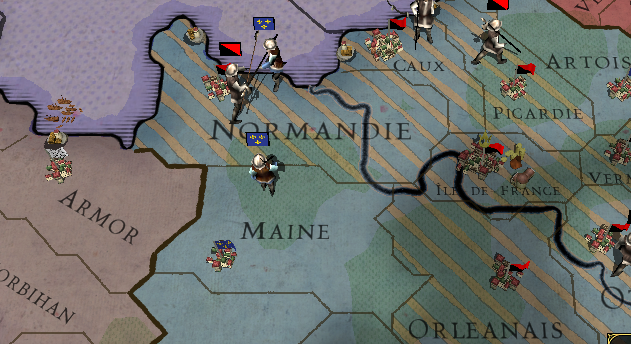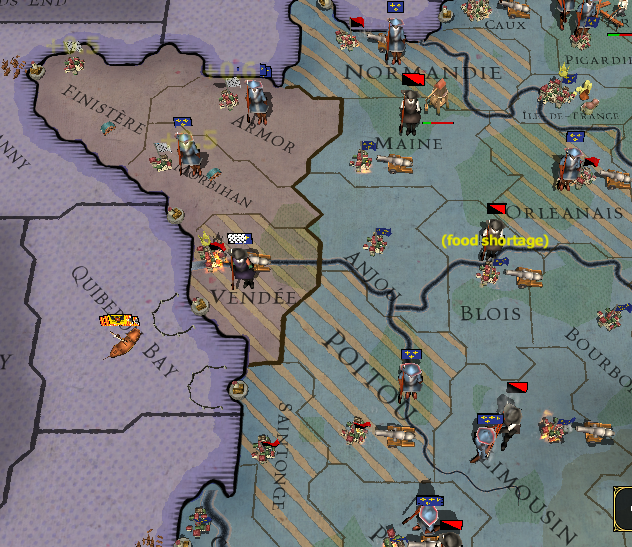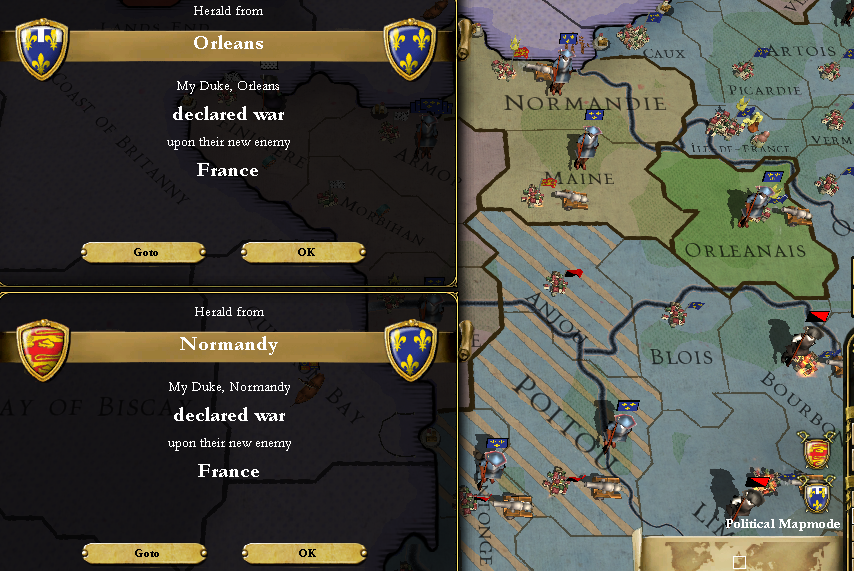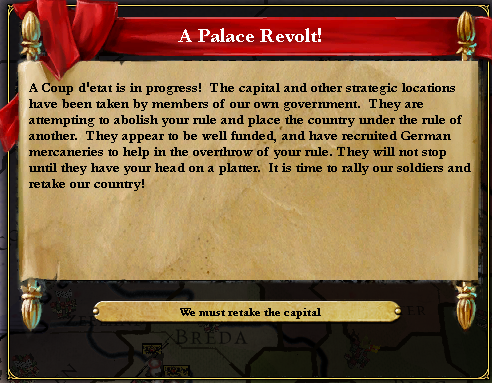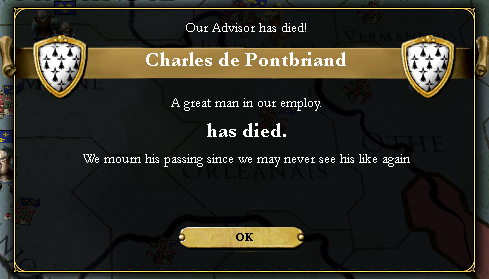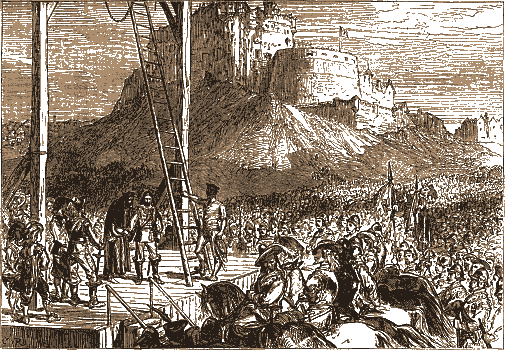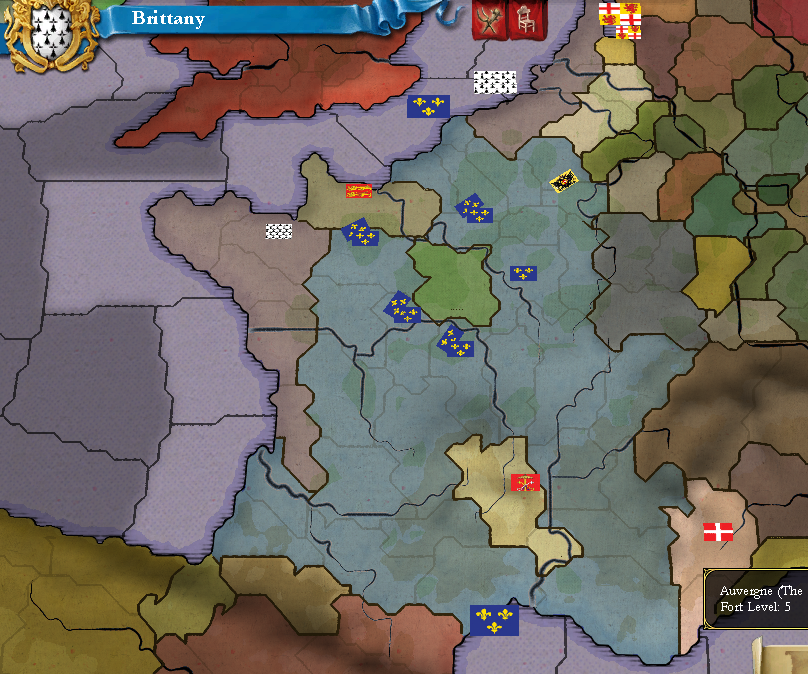chapter X: Authority and Affirmation
The newly-minted Breton middle class had discovered they had as much or more in kin with the wealthy burghers of Amsterdam or Antwerp, and young people had flocked to the cities to take part in the Renaissance. The rocky isle of Ensh Ouza, the very tip of continental Europe, was home to a fine arts academy founded by old Maurice d’Airan, and it produced works to rival the Italian masters; Dutch artists in particular flocked there by the dozens.
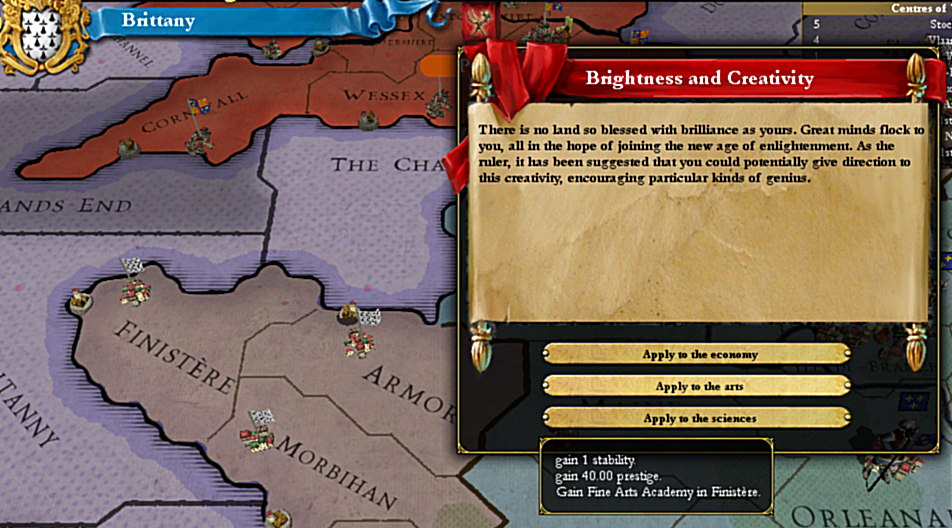
So, as the leading families of Bretagne made their way to Nantes, the word on the lips of every commoner was “As you were.” The sky had not fallen in; the state was not torn asunder. Merchants made money, Bishops exhorted, sailors caught fish, soldiers drilled – the whole country seemed eerily at peace, even the Dutch provinces.
de Pontbriand watched the families maneuvering with a detached, bemused eye. The aristocratic Coizochs, the leading family in Morihban, pushed for a fast resolution, with their scion as the new Duke; the Dutch provinces, and even many in Nantes, wanted to install Carice as duchess… but all eyes were on the Armorian families, and the question at hand was “Where is Claudine?” de Pontbriand knew the answer.
It was a dramatic entrance, indeed; as cosmopolitan as Nantes had become in the last twenty years, no one could say they remembered such an occasion as a Queen of France coming to town. Fifty carriages, thousands of brightly liveried soldiers, courtly ladies by the cart-load. As the various Breton nobles scurried throughout the palace to plot what to do next, de Pontbriand made his way down from his tower, Pier du Tonquedoc’s old tower, to greet the most spectacular carriage of them all. The diplomat marshaled what nobles he could, but it served his purposes that they look chaotic and disjointed. It was just the impression he wanted to give the King of France as he exited the carriage after his wife.
The much-anticipated hostility from the Breton nobles simply melted away in the face of the force majeure of the French monarch. Charles IX spoke with a quiet eloquence in front of the Breton Estate the next day, of the great friendship between their two peoples, of the need for stability in both countries. He was getting close to, but not quite at, fluency with Breton. And there was the trump card: Claudine’s claim to the throne was more convincing than any other noble could make.
Charles IX immediately let it be known that he would not consider the title ‘Duke de Bretagne’ to be hereditary through his male heirs, but rather vowed that his first daughter would inherit the title ‘Duchess de Bretagne’ from Claudine and that she would take a Breton noble as her husband when she came of age. The Dutch provinces and Meath were promised a greater degree of autonomy, securing their compliance. In the end, 17 of the 22 members of the Estate voluntarily swore to the new Acts of Succession, and Charles IX was ceremoniously re-installed by the Bishop of Nantes as King of France and Bretagne.
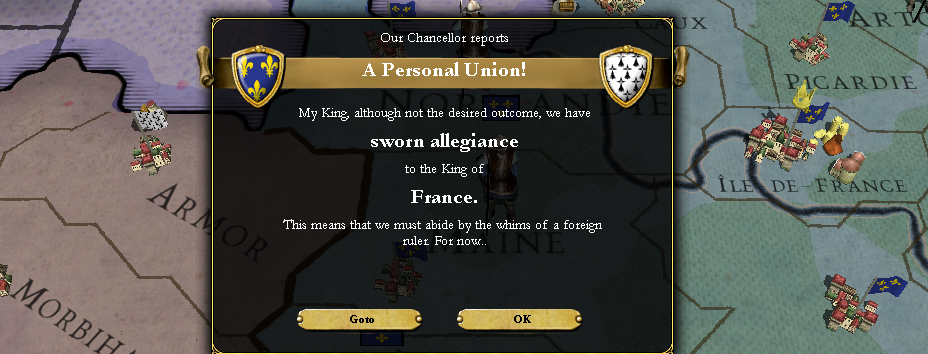
The night before Charles IX and Claudine were to return to Paris, de Pontbriand received a visit from Gilles Dansvier, le Duc d’Anjou, who had come the short distance for the investiture of Charles IX. The wiry, restless young Duke was not one for pleasantries, and cut right to the point: “There is unrest in the provinces, many provinces. Not all France would be upset if Bretagne were to buck the King’s rule.”
de Pontbriand was as always alert to the possibility that his loyalty was being tested… except that he knew Dansvier spoke the plain truth. “Is the new tax code so severe as that?” he asked.
“It’s worse than severe, unless you have the good fortune to live in the Ile-de-France… or Bretagne,” Dansvier said, not without a hint of malice.
“Yes, Charles has chosen to keep our taxing administration in place, he admires our efficiency,” de Pontbriand said.
“Just as other provinces will resent your independence,” the Duke shot back. “Just consider it friendly advice… there may come a time when your people will have to choose sides. Someone here had best be ready to make that choice.”
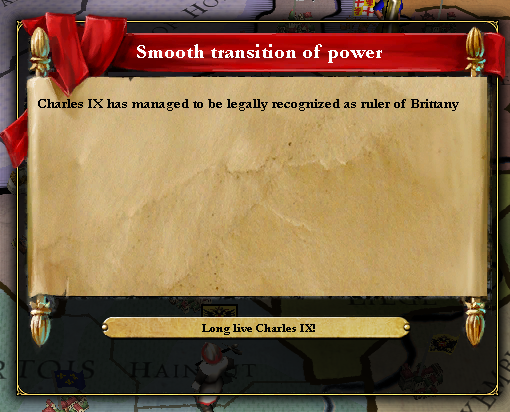
Nantes, Bretagne, June 1504
As the last male heir of the House of Monforzh died in a rainy Amsterdam alley, Bretagne underwent a momentous change. Charles de Pontbriand sent messengers to the eight provincial seats, summoning the Estates to Nantes to discuss the crisis of succession. Remarkably, no province was yet in outright revolt, and even the vassal-state of Munster had cleaned up its own internal dissent and seemed to be waiting to see what result would come out of Nantes.The newly-minted Breton middle class had discovered they had as much or more in kin with the wealthy burghers of Amsterdam or Antwerp, and young people had flocked to the cities to take part in the Renaissance. The rocky isle of Ensh Ouza, the very tip of continental Europe, was home to a fine arts academy founded by old Maurice d’Airan, and it produced works to rival the Italian masters; Dutch artists in particular flocked there by the dozens.

So, as the leading families of Bretagne made their way to Nantes, the word on the lips of every commoner was “As you were.” The sky had not fallen in; the state was not torn asunder. Merchants made money, Bishops exhorted, sailors caught fish, soldiers drilled – the whole country seemed eerily at peace, even the Dutch provinces.
de Pontbriand watched the families maneuvering with a detached, bemused eye. The aristocratic Coizochs, the leading family in Morihban, pushed for a fast resolution, with their scion as the new Duke; the Dutch provinces, and even many in Nantes, wanted to install Carice as duchess… but all eyes were on the Armorian families, and the question at hand was “Where is Claudine?” de Pontbriand knew the answer.
It was a dramatic entrance, indeed; as cosmopolitan as Nantes had become in the last twenty years, no one could say they remembered such an occasion as a Queen of France coming to town. Fifty carriages, thousands of brightly liveried soldiers, courtly ladies by the cart-load. As the various Breton nobles scurried throughout the palace to plot what to do next, de Pontbriand made his way down from his tower, Pier du Tonquedoc’s old tower, to greet the most spectacular carriage of them all. The diplomat marshaled what nobles he could, but it served his purposes that they look chaotic and disjointed. It was just the impression he wanted to give the King of France as he exited the carriage after his wife.
The much-anticipated hostility from the Breton nobles simply melted away in the face of the force majeure of the French monarch. Charles IX spoke with a quiet eloquence in front of the Breton Estate the next day, of the great friendship between their two peoples, of the need for stability in both countries. He was getting close to, but not quite at, fluency with Breton. And there was the trump card: Claudine’s claim to the throne was more convincing than any other noble could make.
Charles IX immediately let it be known that he would not consider the title ‘Duke de Bretagne’ to be hereditary through his male heirs, but rather vowed that his first daughter would inherit the title ‘Duchess de Bretagne’ from Claudine and that she would take a Breton noble as her husband when she came of age. The Dutch provinces and Meath were promised a greater degree of autonomy, securing their compliance. In the end, 17 of the 22 members of the Estate voluntarily swore to the new Acts of Succession, and Charles IX was ceremoniously re-installed by the Bishop of Nantes as King of France and Bretagne.

The night before Charles IX and Claudine were to return to Paris, de Pontbriand received a visit from Gilles Dansvier, le Duc d’Anjou, who had come the short distance for the investiture of Charles IX. The wiry, restless young Duke was not one for pleasantries, and cut right to the point: “There is unrest in the provinces, many provinces. Not all France would be upset if Bretagne were to buck the King’s rule.”
de Pontbriand was as always alert to the possibility that his loyalty was being tested… except that he knew Dansvier spoke the plain truth. “Is the new tax code so severe as that?” he asked.
“It’s worse than severe, unless you have the good fortune to live in the Ile-de-France… or Bretagne,” Dansvier said, not without a hint of malice.
“Yes, Charles has chosen to keep our taxing administration in place, he admires our efficiency,” de Pontbriand said.
“Just as other provinces will resent your independence,” the Duke shot back. “Just consider it friendly advice… there may come a time when your people will have to choose sides. Someone here had best be ready to make that choice.”

Last edited:


